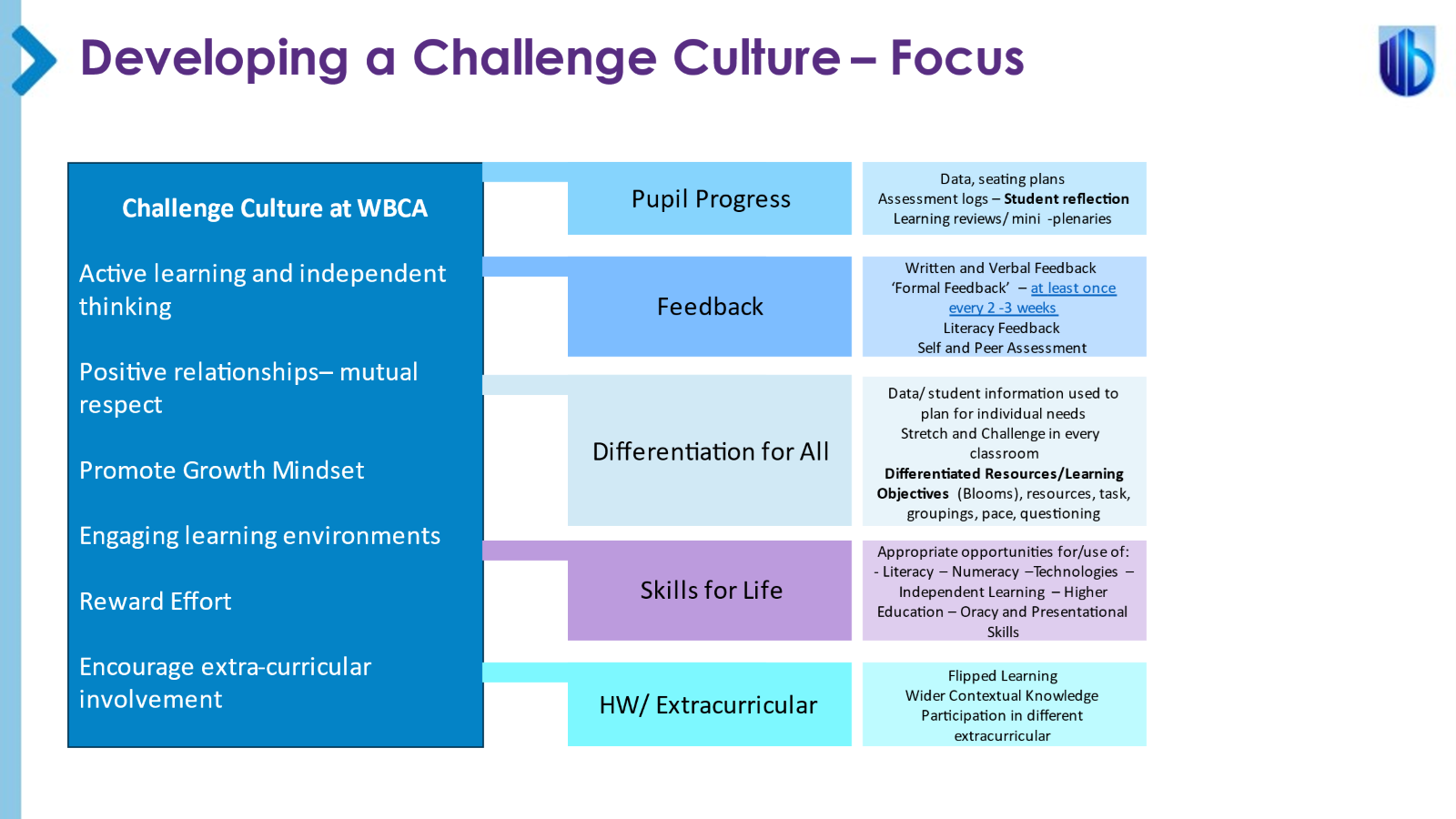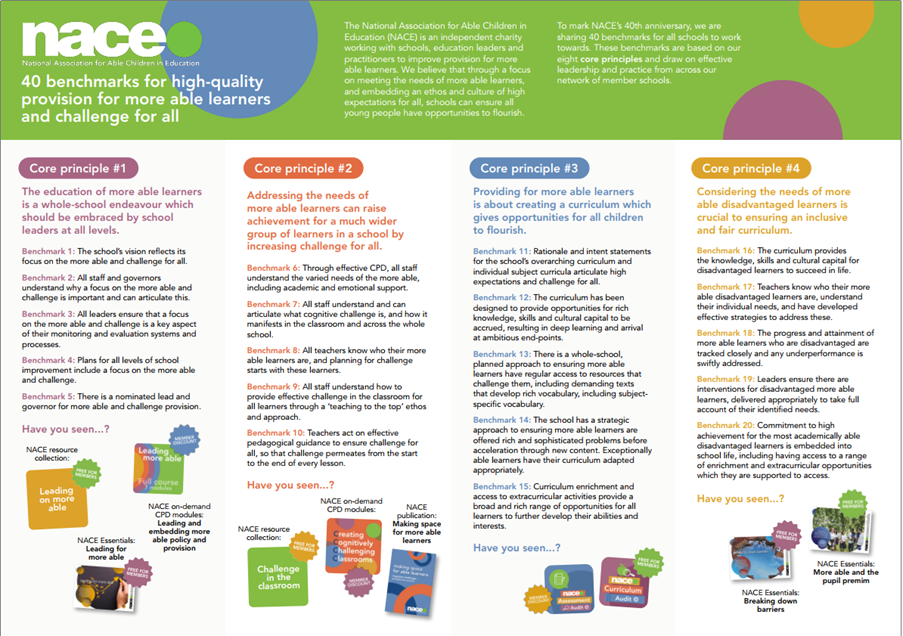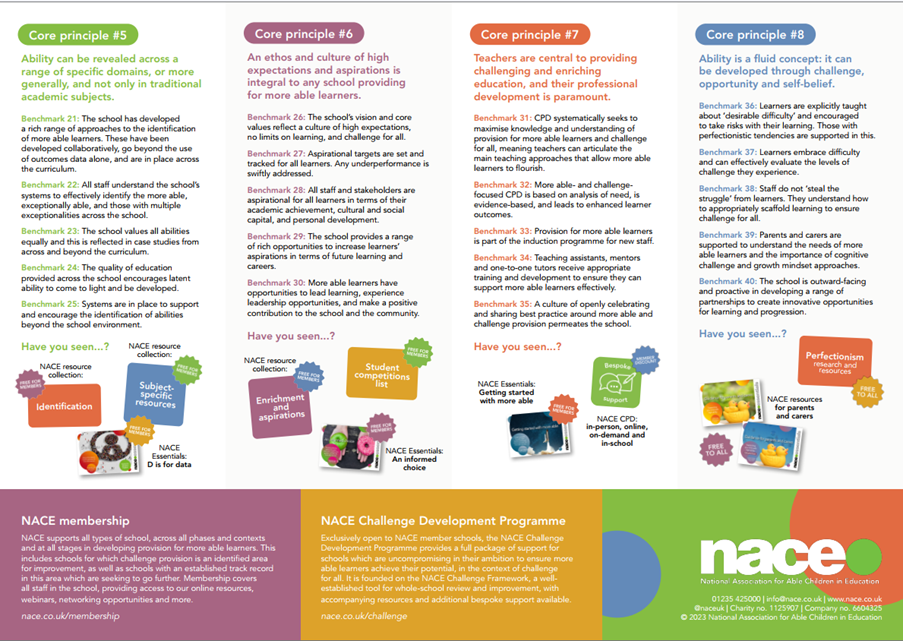Wider Opportunities
Here at WBCA, we are committed to providing support for our More Able students to ensure they get the most out of their education. We are dedicated to creating a Challenge Culture at WBCA.
More Able Learners
At WBCA all learners are valued and respected for their individual strengths, talents, abilities, and interests whether it is across the whole school curriculum, in specific subjects or in the wider community.
We understand that all students, not just the more able, require support and challenge in their learning to make progress and to reach their full potential.
At West Bromwich Collegiate Academy, we use the term ‘more able’ to refer to pupils who demonstrate or have the potential to work at a standard well above their peers; this means they are exceeding the National Curriculum expectations for their age. This may be in one or more areas of learning.
‘More Able’ describes students with one or more abilities developed to a level significantly ahead of the year group.
Students may stand out as being ‘More Able’ through reports by individual teaching staff, producing work of exceptional quality and excelling in end of year examinations. Parents can assist by informing the Academy if students are performing exceptionally well in areas outside the Academy as members of external organisations such as sports clubs or theatre schools or in graded music examinations.
Our goal
We have a responsibility to meet the educational needs of all students. With respect to our More Able students, West Bromwich Collegiate Academy will do the following:
- Have a Senior Leader with an overview for More Able Students.
- Identify students who are More Able and ensure that all staff are aware of their specific learning needs.
- Provide suitably challenging work/activities in lessons
- Support access to extra-curricular opportunities beyond the Academy day.
- Ensure all subject areas have provision for More Able students in all years and deliver activities which support this.
- As we approach Key Stage 4, provide students with access to software packages developed to maximise learning.
- Provide a strong careers programme with opportunities and activities which will give students progression towards their targeted careers.
- Provide opportunities for students to showcase their talents.
- Where appropriate, bring in partners to work with exceptional students.
Developing a challenge culture
We understand at WBCA that in order for students to get the most out of their learning they need to be in the ‘learning zone’. This is an area of the working brain, where you experiment, develop skills and stretch your abilities. Therefore, we have founded a Challenge Culture within our Trust as well as in the school. Below is how we are ensuring the Challenge Culture at WBCA continues to grow.

opportunities
Enrichment activities at WBCA is one way in which we provide opportunities for learners to reveal and develop their abilities. Students will also get the opportunity to participate in exercises which tie in with Careers and their academic future.
- Opportunities for problem-solving, decision-making, analysis, synthesis, creative thinking, speculation, evaluation and research.
- Planning and monitoring of enrichment activities, including clubs, societies, activity days, masterclasses, day visits, visiting specialists, weekend activities, summer schools.
- Collaboration with other schools, external organisations, governors and other individuals with appropriate expertise.
- Opportunities for learners to engage with “real life” scenarios.
- Use of local resources such as libraries, art, drama or theatre groups.
- Opportunities to participate in performances, sports activities, community and other projects.
- Participation in national schemes, competitions and festivals.
- Year 9 Scholars Programme by the Brilliant Club – The Brilliant Club’s Scholars Programme gives pupils from non-selective state schools the opportunity to work with a PhD researcher to experience university-style learning. It helps pupils to develop the skills, knowledge and confidence to secure a place at a competitive university and succeed when they get there.
- Extracurricular clubs targeted with subject-specific stretch and challenges (i.e., Young Engineers and Chess Club).
- RAISE Outreach programme with Birmingham University: Giving students the opportunity to be toured around the Russell Group University.
- Quiz Team Participation: We are currently looking at expanding our quiz efforts by participating in events regionally in the West Midlands.
- Opportunities to participate in University-Style activities through various trips with KS3 and KS4. Currently, this has been at the University of Oxford; University of Birmingham and Warwick University.
- Year 9: Brilliant Club for English Mentoring. Students received mentoring in small groups of three in specified themes within English by a Post-Graduate Tutor to stretch and challenge their abilities.
- Students have also been encouraged to join the National Saturday Club as well as a Virtual Summer Camp by Debate Mate.
- Debate Mate (KS3) – A debating club delivered by our staff along with trained university students. The club raises speaking and listening attainment, as well as improving a range of high order thinking skills and non-cognitive abilities such as confidence, teamwork and leadership.
- Speakers from Aston University carrying out a series of workshops with Year 9 students in preparation for their upcoming GCSE choices.
- Supporting students in their application to the Y10 Target Oxbridge programme where individuals were selected to be given tailored learning on the Oxbridge application process.
Students are encouraged to monitor the ‘Stretch and Challenge Site’ within the Student Portal for upcoming opportunities and activities they can participate in.
more able students

Following the first initial GL Assessments of Y7 students will be identified as More Able. This is a small cohort however, most of the activities following this are aimed at all students with a Target 7 and above.
For consistency purposes students are encouraged to look out for the ‘Stretch and Challenge’ symbol (as seen above) in all subjects which will mean there is a challenge activity for them to undertake. 100% of students surveyed in KS3 were able to inform teachers that this symbol stood for stretch and challenge.
Students are also surveyed from Y8 – Y11 each year to help map the provision for More Able in the upcoming year and to help complete the Action Plan.
The following learning activities are available in Key Stage 3:
- L4L Wider Context Document – directing students to additional reading, watching and doing in order to strengthen their synthesis of knowledge in each theme. Parents are also emailed the list to encourage familial activities. An example of how we delivery this can be found here.
- Practice Exam Questions – for each theme from Y7 to Y9 students are encouraged to complete a small collection of exam-style questions in timed conditions to prepare students for upcoming exams. Practice makes progress!
- Liaising with the WBCA Library – students can login to our Library Management System App (Accessit) at home or at school using their school login details; from there they can access the wider context books and reading challenges that are available in the library through the section titled Reading Lists. Each reading list includes books either related to their library lessons or L4L. These reading lists are working documents which can be added to when new relevant books arrive in the library.
- Building Growth Mindsets.
- Encouraging High Expectations – stretch and challenge image.
- Encouraging Extracurricular Involvement.
- Promoting Independent Study.
- Higher Education, Next Steps – Liaising with Careers guide as well as with students to understand what they are doing in the future.
- Understanding of Expectations – By KS4 students should be aware of the expectations which have been reinforced since Y7.
- Wider Contextual Knowledge – Students need to be encouraged to read around the GCSE subjects and understand the importance of what they are studying.
- Growth Mindset Wellbeing – Students in KS4 can feel overwhelmed about their target and requirements to achieve this. Students are therefore encouraged to discuss their well-being. Teachers also make sure that students possess a growth mindset.
- Independent Study through revision techniques.
- Continued stretch and challenge in lessons.
- Masterclass interventions for students with Target Grade 7 and above.
provision for the more able
We endeavour to meet the needs of More Able children through careful identification and monitoring strategies and by providing access to a curriculum that will not only support the development of the whole child intellectually, socially, and emotionally, but will enable them to show aptitudes and quality of thinking.
We strongly believe that engaging teaching and learning for all is the key to securing achievement for every child. Through creative curriculum activities, more-able pupils are given a wide variety of exciting challenges and experiences, developing the ability to question, explain, persevere, communicate their thoughts, and take risks in their learning whilst building relationships.
We support our more-able pupils by giving them opportunities for open-ended tasks, higher-order thinking challenges and extension activities. In class children work in a range of ways: ability groups, mixed ability, paired work, and independent work. We use a variety of teaching styles and a range of higher-level questions to stimulate critical thinking. Furthermore, we provide more able students with many opportunities outside of the classroom through extracurricular activities to further stretch themselves.
Students are encouraged to be independent at accessing stretch and challenge extensions encouraging a growth mindset which facilitates intrinsic motivation. Having a growth mindset is important because it can help students overcome obstacles they may face when learning something new or developing a new skill. Growth mindsets understand the importance of persistence and determination. By changing the way students think, students can change the way they learn. Although teachers and members of the school community can encourage students to attend extracurricular activities, visit the stretch and challenge site on the student portal for additional tasks or offer challenge extensions within lesson to encourage higher thinking, it is the student’s prerogative and responsibility to accept this guidance.
Through our subscription with NACE – National Association of Able Children in Education – we have RAG rated and focused on the provision of the 40 benchmarks for high-quality provision for more able learners and challenge for all in order to make sure the provision provided by our staff develops the challenge culture of WBCA.


Support from parents and carers is a key factor in the success and development of all young people, including the more able.
There are many ways that parents can support their more able children. Below are just a few ideas that you may like to try.
- Encourage them to take up a hobby (this can be in or outside of school).
- Encourage independent research (Use local libraries or the school library which has a range of materials for the more able student).
- Encourage them to read national newspapers or to watch the news on television, to help their knowledge of current affairs.
- Talk to them about what they have learnt in school during the day and what has particularly interested them.
- Support homework activities by ensuring that the work is completed to a high standard.
- Encourage creative and independent interests using resources either from local libraries, the internet, or the school.
- Help to develop team skills including cooperation and leadership by encouraging your child to take part in team games and sports.
- Encourage your child’s work in school, providing rewards for good work, to stimulate an environment of positive achievement.
- Talk to them about Thinking Skills and encourage them to do lateral thinking puzzles etc., to increase and develop these skill.
- Suggest that the student challenges themselves through their reading, exploring both non-fiction, fiction, and different genres.
To find out more about more-able provision at WBCA, please feel welcome to ask our More Able Student Coordinator Miss Langley, about any questions you may have: ulangley@wbca.shirelandcat.net


